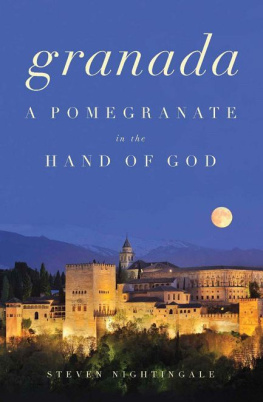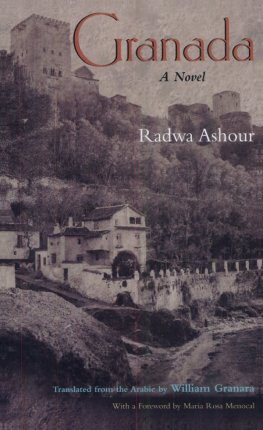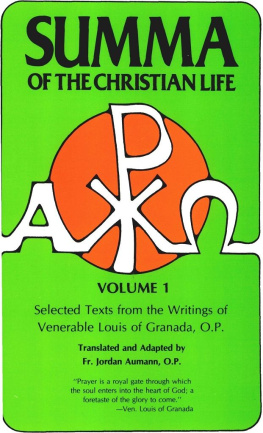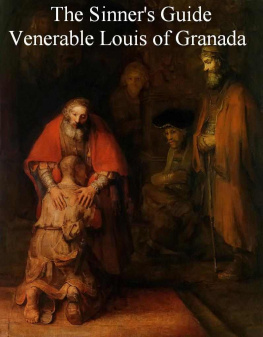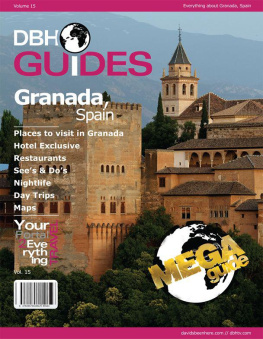GRANADA

Copyright 2015 Steven Nightingale
All rights reserved under International and Pan-American Copyright Conventions. No part of this book may be used or reproduced in any manner whatsoever without written permission from the publisher, except in the case of brief quotations embodied in critical articles and reviews.
Library of Congress Cataloging-in-Publication Data Is Available
ISBN 978-1-61902-506-6
Cover design by Natalya Balnova
Interior Design by Megan Jones Design
Counterpoint Press
2560 Ninth Street, Suite 318
Berkeley, CA 94710
www.counterpointpress.com
Distributed by Publishers Group West
10 9 8 7 6 5 4 3 2 1
A nuestros vecinos Albayznerospor vuestra inteligencia y gracia, y vuestro espritu acogedor y juguetn
A Christyn Marshall-Ramireztan fiable, lcida, y generosa
y
A Lucia y Gabriellapor vosotras vivo.
Por qu Cristbal Coln No pudo descubrir a Espaa?
Why wasnt Christopher Columbus Able to discover Spain?
PABLO NERUDA, LIBRO DE LAS PREGUNTAS
Contents
T HE JUICE OF the pomegranate sweetens our hands. All afternoon, we have picked from the fruit the crimson pods of juice. Within each pod, a seed. On our table, the bowl fills with the luscious harvest. The roughly handled seedpods shine in the clear hot light of Granada.
I sit close together with Lucy, my wife, and Gabriella, our 3-year-old daughter. We live here, in the medieval neighborhood of the Albayzn, in a house with a garden. The Albayzn gathers its white houses on this south-facing hillside; gardens and houses here fill with light all morning, and then, warm and fragrant, settle into the languorous afternoon.
Granada, in Spanish, by a happy chance, means pomegranate. The fruit is the symbol of the city. It is seen everywhere, on plates, in designs set into the cobblestones, on the faces of buildings. When we pick the seeds from a pomegranate, we hold the history of the city in our hands. As the fruit is swollen with juice, so is it packed with the ideas, the lives, the secrets and stories of the people of Granada, and of the great Mediterranean cultures that have made their home here.
Lets take, for starters, some experiences common to us all, because we are flesh: say, sexual love and death. And some ideas common to us all, because of our spiritual heritage: say, paradise and the sacred. How might all this be mixed up with these bright seeds in our hands?
In the Song of Songs, the lover delivers this praise to a woman he loves: A crimson ribbon your lipshow I listen for your voice! The curve of your cheek a pomegranate in the thicket of your hair. It is the voice of a man in love, who wants to taste the woman of his longing. He would find his way into her hidden sweetness. He says, An enclosed garden is my sister, my bride, a hidden well, a sealed spring. Your branches are an orchard of pomegranate trees heavy with fruit. As the temperature of this already-molten book of the Old Testament rises further, she gives him her promise: Let us go early to the vineyards to see if the vine has budded, if the blossoms have opened and the pomegranates are in flower. There I will give you my love. The cultivation of the pomegranate, we note, spread in the ensuing centuries all through the lands of the Mediterranean.
Yet we know that images of this erotic fruit adorned a holy placeSolomons temple itself. The design of the temple is described in the Old Testament. The materials were stone, sheets of gold, cedar, precious gems; and set prominently on the capitals of the pillars astride the entrance, carved images of pomegranates, hundreds of them, in rows. In fact, the only artifact we possess known to be of use within Solomons temple is an inscribed piece of ivory, thought to be the head of a priestly scepter, and unmistakably a pomegranate in flower.
If all this were not enough, if one cuts a pomegranate lengthwise and lays it open, the seedpods show themselves bunched into the six-pointed star we know as the Star of David.
What is it about this fruit that touches the sacred? The tree, native to Persia, shows a dark, straggly silhouette. But in spring, among sudden leaves of reddish green, deep orange flowers appear, which darken to red and fold in as the fruit begins to take shape. As it grows, the skin thickens and roughens until it is the texture of old leather, as though it had lived through seasons of sunlight and had long tales to tell. Then, late in the summer, over a course of days, the rough skin splits, as if it could not contain its sweetness. Crimson seedpods show forth in sensuous bunches. Each pod is full of juice. It is the color of blood. It will darken your hands. It marks your clothes indelibly. It tastes of a strange, direct freshness, both sour and sweet. The harvested seeds heaped in a bowl so ravish the eyes that we stop our labors to watch the glistening.
Living through the seasons with a pomegranate tree, we can guess why the fruit is thought to partake of the sacred. It is incorrigibly beautiful. In the fecund splendor of packed seeds there is a promise of life irrepressible. The fruit swells and opens in the hot months, showing crimson and delicious flesh; its intensely sexual, putting us in mind of lovemaking and life-making. And the way the skin bursts to show an inner beauty makes us think of a coming forth of soul from the body.
If all this means something, then we are likely to find the pomegranate associated with paradise; and so we do. Some scholars believe that the tree of knowledge in the Garden of Eden was a pomegranate. In the Koran, Allah sketches the gardens of paradise in the Sura of the Merciful, the Gracious One. This hypnotic Sura of high poetry, by tradition revealed early and as a whole in Mecca, speaks of a delicious space in the next world: fresh springs, dark leaves of lush trees, women with ruby and coral skinand fruit trees, which encompass all varieties, but of which, curiously, only two are mentioned: the date and the pomegranate. In the Hadith, which are the statements of Muhammad noted down while he lived, we hear him say: There is not a pomegranate on earth that does not have a pip from one of the pomegranates in the Garden of Paradise. This useful idea we find frequently in the Koran: that we have here present on earth pieces of heaven, signs that we learn to recognize. Such signs are called, in Arabic, ayat. By understanding them, it is said, we may discover a way to move intuitively and irresistibly toward the divine.
Five centuries later, we have Jalalludin Rumis great book, the Mathnawi. Rumi was born in Afghanistan, lived in Konia, in Asia Minor (present-day Turkey), and was a contemporary of Saint Francis. Many consider the Mathnawia hive of stories, injunctions, metaphorical adventures, songs, and parablesto be the most powerful mystical poem ever written. In one section, Rumi writes about companionship with saints, and about the signs that mark a teacher of real knowledge. He likens our encounter with such a man or woman to the buying of a pomegranate: buy it laughing and open-mouthed, that its laughing may give information about the state of its seeds. How blessed is its laughter, that shows the heart in its mouth. Such is Rumis portrayal of one whose knowledge is so uncommonly advanced that it has come forth in joy. In Rumis teaching, a real teacher shows himself directly and usefully to anyone who, with suitable preparation, seeks just such knowledge.
Next page
